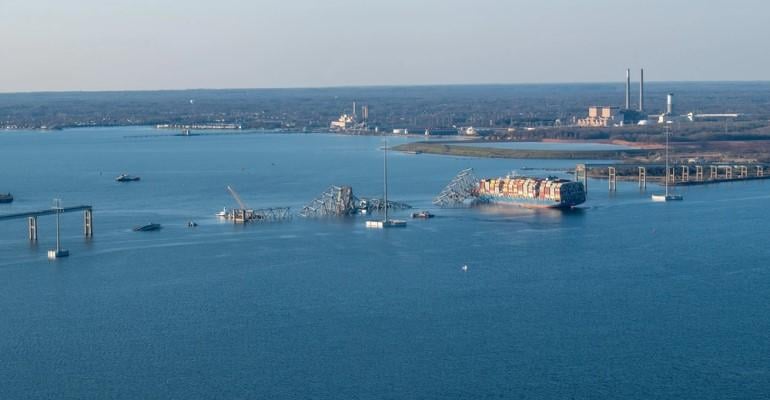The 10,000 teu Dali lost power shortly after leaving Baltimore port on 26 March and slammed into the Francis Key Bridge, which collapsed, killing six workers and blocking the entrance to the port.
In its filing the city alleges: “Grace Ocean Private Limited and Synergy Marine Pte Ltd saw fit to put a clearly unseaworthy vessel into the water. Petitioners’ actions were grossly and potentially criminally negligent. In no way should their liability be limited.”
Grace Ocean and Synergy Marine had originally filed a law suit petitioning the Maryland District Court to exonerate the companies and to limit their liability to $43,670,000, the value of the ship plus the outstanding freight.
According to the city’s filing alarms had sounded on board the Dali “hours before it departed”.
Alarms were set off on the vessel’s refrigerated containers as the Dali wad experiencing inconsistent power supply to the reefers.
Crew did not investigate or did not repair the fault before the vessel sailed, according to the city lawyers.
“The Dali’s onboard data recorder recorded audio of ‘numerous aural alarms’. The onboard data recorder then briefly stopped recording, and then turned on again, using a redundant power source.” However, the source was not powerful enough to allow the Dali’s crew to regain control over the ship.
Baltimore city lawyers allege that the owner and operator’s “negligence” was “readily apparent”, and no blame can “conceivably be lain at the City’s feet for the allision”.
Instead, the accident was allegedly a “direct and proximate result of Petitioners’ carelessness, negligence, gross negligence, and recklessness, and as a result of the unseaworthiness of the Vessel.”
City lawyers estimate that Baltimore generated over $70bn of “economic value” last year, including billions of dollars in annual tax revenues.
If the city is successful in proving the companies were negligent, the cost of the lost revenues alone would run into billions of dollars, and that is not including the cost of rebuilding the destroyed bridge; the cost would vastly overshadow the $43.6m that is offered in the owners petition for exoneration.
Such sums would be liable if the city can prove, as it alleges, that the accident was caused by an “incompetent” crew, who were poorly trained, did not follow local navigational customs, that the owners failed to properly oversee its fleet to make certain that it was being operated in accordance with company policies and procedures, principles of good seamanship, and in accordance with all applicable laws and regulations.
Lawyers further allege that the owners had failed to properly maintain the vessel and its systems and had, “Failed to timely eliminate known or knowable hazards,” as well rectify any known deficiencies.
Copyright © 2024. All rights reserved. Seatrade, a trading name of Informa Markets (UK) Limited.
Add Seatrade Maritime News to your Google News feed.  |
